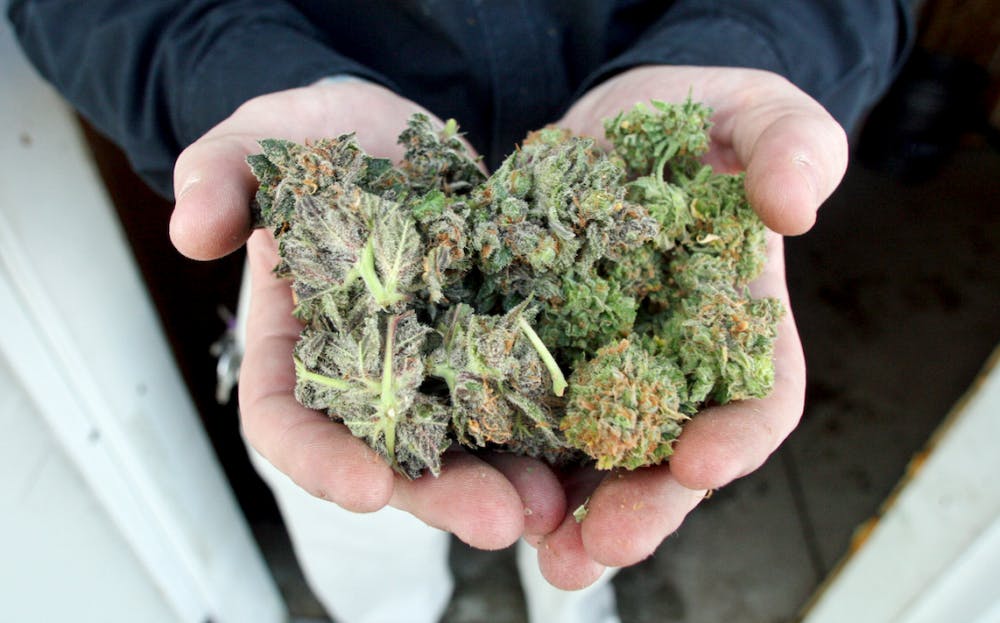On Thursday, Feb. 26, the Vermont Senate voted 17-12 to approve a bill legal- izing the recreational use of marijuana in Vermont. The bill, S.241, brings Vermont one step closer to be coming the fifth U.S. state to legalize marijuana. It will now proceed to the State House of Representatives, where the Judiciary Committee will begin to iron out details in the next several
weeks.
According to the bill, lawmakers “...recognize legitimate federal concerns about cannabis reform,” and seek to pass legislation establishing a pathway to legal access to cannabis in Vermont.
The bill lists numerous problems related to prohibition, including “distribution of cannabis to persons under 21 years of age,” revenue of sales going to “criminal enterprises” that are associated with increased lawlessness and violence, “drugged driving and the exacerbation of any other adverse public health consequences” and the possession or cultivation of cannabis on public or federal property.
If approved in its current form, S.241 would create a system for marijuana taxation and regulation, allowing Vermonters who are 21 and older to possess up to an ounce at a time. The bill would take effect beginning on Jan. 2, 2018.
Tax revenue would help fund law-enforcement and drug treatment programs, and permits would be issued for up to thirty marijuana stores throughout the state. Additionally, an amendment passed on Thursday, Feb. 25 allows for the expansion of cultivator licenses, which will enable more individual citizens to grow their own marijuana.
In the past several years, marijuana legalization has emerged as a key issue in state politics. In his final State of the State address in January, Governor Peter Shumlin called for legalization, and has endorsed the current legislation.
“The War on Drugs has failed when it comes to marijuana prohibition,” Shumlin said in the speech. “Under the status quo, marijuana use is widespread, Vermonters have little difficulty procuring it for personal use, and the shadows of prohibition make it nearly impossible to address key issues like prevention, keeping marijuana out of the hands of minors and dealing with those driving under the influence who are already on Vermont’s roads.”
“With over 80,000 Vermonters admitting to using marijuana on a monthly basis, it could not be more clear that the current system is broken,” Shumlin continued. “I am proud that the Senate took [the] lessons learned from states that have gone be- fore us, asked the right questions, and passed an incredibly thoughtful, common-sense plan that will bring out of the shadows an activity that one in seven Vermonters engage in on a regular basis.”
If the bill were eventually passed, Vermont would become the first state to legalize marijuana through legislative action. The previous four states – Alaska, Colorado, Oregon and Washington – have done so via ballot initiative.
Mark Williams, a Professor of Political Science at the college currently teaching ‘The political economy of drug trafficking’ Political Science course, expressed that the bill would not solve all of Vermont’s problems.
“Legalizing marijuana won’t solve the broader problems of drug abuse or addiction,” Williams wrote in an email, “and it’s unlikely to decrease the number of Vermonters who use this particular drug. However, it would address some negative externalities our current drug policies generate: overcrowded jails/prisons; a rap sheet and jail time for nonviolent marijuana offenders; a thriving black market...”
Unlike some of the previously listed states, Vermont is unique in the level of popular support for marijuana legalization. The Vermont electorate overwhelmingly supports legalization of marijuana; a recent poll from Vermont Public Radio (VPR) showed 55 percent supported legalization, versus only 32 percent opposed. 13 percent of those polled said they were unsure.
Of course, support for legalization amongst government officials is far from universal. Lieutenant Governor Phil Scott, a Republican frontrunner for Governor in the coming election, says the bill raises too many unanswered questions.
“In my opinion, this bill is as much about the money as it is about ending a failed prohibition, and this major policy shift should not be about money and commercialization,” he said in a statement.
Citing unresolved issues such as highway safety and the potential need for “multimillion dollar expansions of our current smoking cessation programs,” Scott advised that Vermont wait a few years to “review the positive and negative effects” of legalization in states that have already completed the process.
Skeptics of the bill have also cited federal law, arguing that because marijuana remains a schedule I substance on the Controlled Substances Act of 1970, legalization at the state level nullifies federal law.
When asked about whether a Republican president might reverse the decision, State Senator John Rogers (D) seemed unperturbed. He cited the Cole memo, a letter written by former Attorney General James Cole, which assures that federal agents will not conduct raids in states that allow “...possession of small amounts of marijuana and provide for the regulation of marijuana production, processing, and sale.”
“I think there’s always concern, but clearly what they have been doing for the last 40 years hasn’t worked,” Rodgers said
in an interview. “I think it’s time for the states to take the lead because the federal government isn’t going to act.”
Others have expressed doubts that the bill will be able to pass the House of Representatives, where support is tepid despite a strong Democratic majority. House Speaker Shap Smith (D) said the bill will need to move through several committees, and that pushing it through the House “will take work.”
“The bill has not come over with a ton of momentum,” Smith said, referring to the Senate’s relatively narrow vote margin. “I think that if you had seen a bill that came over with 20 votes or more, that would have been a different signal.”
Smith has remained pragmatic about legalization, and insisted that if there is not adequate support for the bill, he would not be opposed to delaying marijuana legalization.
If it is clear that we don’t have the support and we can’t get it right this year,” Smith said, “then we’re not going to push something forward that’s not ready for prime time."
Governor Shumlin, however, insisted that there is no good reason for further delaying the legalization process.
“My prediction is, what happened in the Senate may well happen in the House: logic, good information will encourage House members to do what they were elected to do, which is to make their best judgments to protect the safety, health and welfare of the people who elected them."
The bill has also caught the attention of legislators and law-enforcement officials outside Vermont. One such voice was Police Chief George Bell of Cambridge, New York. In an interview with WRGB News, he explained that he would continue to treat
the possession of marijuana as a criminal offense, unless it was prescribed in New York.
In fact, both Massachusetts and Maine will likely conduct a ballot on recreational marijuana legalization this November as well.
“I don’t think anybody in law enforcement at this point knows how they are going to deal with it if it does go in Vermont
like this,” Bell explained in the interview. Massachusetts Attorney General Maura Healey (D) also opposes recreational marijuana. After the legalization of marijuana in Colorado, Healey artued that an increased rate of auto accidents and fatalities is sufficient evidence to not legalize the drug. “What’s most profound to me is what this means for young people,” Healey told the South Shore paper. She went on to reference the propensity for younger users to abuse the drug in unsafe environments.
Similar legalization efforts have occurred in Rhode Island, Connecticut and New Hampshire.
In the Granite state, one bill is pending before a committee of the New Hampshire House. However, similar bills have been killed by the New Hampshire Senate.
Comments




